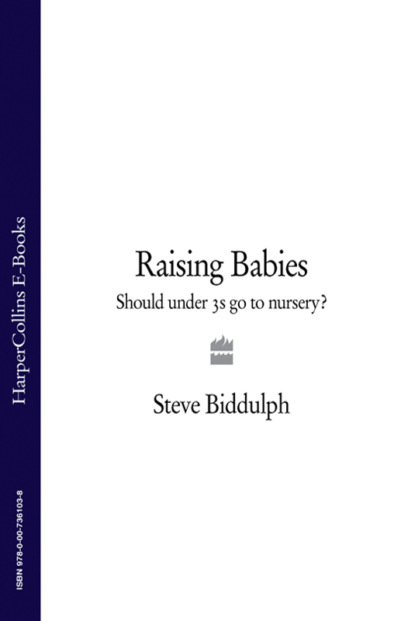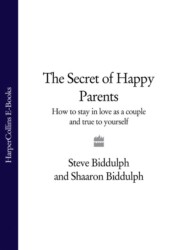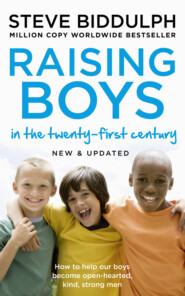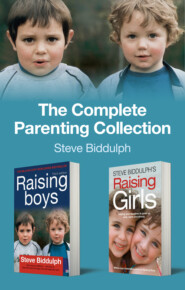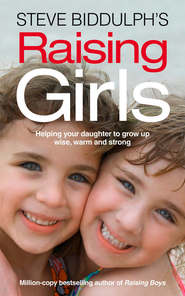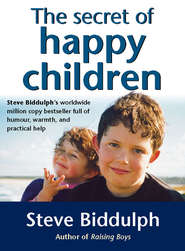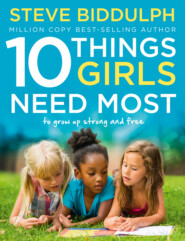По всем вопросам обращайтесь на: info@litportal.ru
(©) 2003-2024.
✖
Raising Babies: Should under 3s go to nursery?
Автор
Год написания книги
2019
Настройки чтения
Размер шрифта
Высота строк
Поля
Raising Babies: Should under 3s go to nursery?
Steve Biddulph
Steve Biddulph, the favourite number one name in parenting psychology – and bestselling author of Raising Boys – examines how different childcare options are likely to affect you and your child in this rivetting and highly topical bookThis topical book tackles a key issue all new parents face. Steve Biddulph looks at childcare choices and the dilemmas that so often arise:- ‘I want to stay at home with my child but don’t know how I can’- ‘I don’t know what is better: nursery, creche or childminder’- ‘if other people look after my child will it affect its development and happiness?’It examines the two-income ‘slaves to work’ culture in the UK and how in the past ten years, the number of babies and toddlers under three who are spending all day (8am to 6pm) in nurseries has quadrupled. Biddulph urges caution and warns that the hurried and disconnected way that families now live their lives could be damaging to a whole new generation’s mental stability and development.The book is an eye-opener in terms of child development and provides useful case studies from parents who are stay-at-home and those using all-day or part-time childcare – groups sociologists have named ‘slammers’ and ‘sliders’ respectively.
Raising Babies
Steve Biddulph
Should under 3s go to nursery?
Table of Contents
Cover Page (#uebc84ba7-9cf4-552f-a306-9e462f8091fd)
Title Page (#u11024f89-c230-5709-befb-af67e1daa077)
Introduction (#ub1208939-32e8-50e1-85c9-bb5c42d8df45)
Part One The Truth about Nurseries (#ue93662ba-afc6-5446-b085-8c6d8f8e32b3)
1 What nursery is like (#u5d9a0548-4b5a-5b27-833d-4bfee7f4d396)
2 Slammers and sliders (#ua946d318-392e-50f4-bed7-2845eba24ed6)
3 Does nursery harm under-threes? (#ubbbeda78-943d-5c57-90ef-3e05a9436006)
Part Two How a Happy Child Grows (#litres_trial_promo)
4 Your baby’s growing brain (#litres_trial_promo)
5 How babies teach us to parent (#litres_trial_promo)
6 Babies and emotional intelligence (#litres_trial_promo)
7 Why nursery doesn’t work for babies (#litres_trial_promo)
Part Three Home and the World (#litres_trial_promo)
8 Couples at the coalface (#litres_trial_promo)
9 Our world of greed and speed (#litres_trial_promo)
10 A world where love can thrive (#litres_trial_promo)
APPENDIX Recommendations (#litres_trial_promo)
Inside Stories (#litres_trial_promo)
Notes (#litres_trial_promo)
Index (#litres_trial_promo)
Acknowledgements (#litres_trial_promo)
About the author (#litres_trial_promo)
Other books by (#litres_trial_promo)
Copyright (#litres_trial_promo)
About the Publisher (#litres_trial_promo)
Introduction (#ulink_539debaf-33a4-5132-ac3f-a6681d7322ec)
This story begins 30 years ago. I was a young psychologist, just starting out, and I was sitting at my desk at around nine in the morning when the phone rang. The caller, a young woman, was in tears. For a moment or two I couldn’t make out who she was, but I soon realized it was a friend – a social worker who had recently become the mother of a baby boy.
She was calling from her office. It was her first day back at work after four months of maternity leave, and she was very upset. She had just left her baby son for the first time, in a day nursery a couple of miles away from her workplace. This had always been the plan, long before her baby was born. But the baby had been acutely distressed to be left with strangers, and now she was distressed too, unable to concentrate on her work. She was worried that she was making a terrible mistake.
So we talked the problem over. I knew that most people would have said something to her like: ‘Don’t worry! I’m sure your baby is fine now. The staff are used to handling babies. He’ll be happy and content when you go to pick him up’, or some similar combination of reassuring platitudes. But I didn’t say any of this. I asked her to tell me more about the situation. What she told me was revealing, and shocking in a way, but a tale that has come to be familiar as I talk to young parents all over the world.
As with most women (and many men too), my friend’s decision to go back to work was made amid a tangle of other people’s needs and expectations. Most of her friends had given birth to their babies, put them into nurseries at three, six or twelve months, and gone back to full-time work. It was the normal thing for her peer group, and it had simply been expected of her too. Her husband also wanted her back at work; they needed the money if they were to keep on track with their financial plans. Her boss wanted her back in the saddle as quickly as possible; she was a valued worker. However, there was something missing from this whole picture. What did she want? Somehow the most important question of all had not been asked – let alone answered!
What my friend was experiencing wasn’t just the panic of being away from her baby for the first time in his life. It felt wrong to her in a deep way, and she realized she had been dreading this day. She had spent the last four months engrossed in her baby, finding her new role challenging, but also surprisingly and deeply rewarding. She did not want to miss out on the special and precious time when her little boy seemed so full of life, and was developing so quickly. It wasn’t just her own needs, she knew she was the centre of this little baby’s universe; it felt like a betrayal to leave him screaming in despair and walk away. Her modern ideas of independence were suddenly at war with deeper, newly aroused feelings and thoughts about what was important in life.
As we talked on, these feelings did not go away. In fact, they gained strength as her emotions, values and thinking all began to line up. In the end, she decided to request a meeting with her boss that same day and discuss a different course of action. In the end she took a further 18 months off and after that only returned to work part-time. She was deeply happy and relieved. And she was also lucky to have a good employer, a supportive partner and sufficient income to be able to make this choice.
In the three decades that followed, I watched the use of full-time day nursery care for very young infants and toddlers increase dramatically in many countries around the world. I also visited many nurseries and daycare centres in person, and observed close-up the lives that little children had there, and the working conditions and feelings of the staff.
I had started out as a believer in the ideal of quality nursery care, and the role it played in allowing women to broaden their lives. (Like everyone else, I didn’t question the role of men.) But the more I saw of the reality of daycare centres and nurseries, and the more conversations I had with parents and carers, the clearer it became to me that the reality never matched the fantasy. In fact, it was often a disastrous disappointment. The best nurseries struggled to meet the needs of very young children in a group setting. The worst were negligent, frightening and bleak: a nightmare of bewildered loneliness that was heartbreaking to watch. Children at this age – under three – want one thing only: the individual care of their own special person. Even the bestrun nurseries cannot offer this. My professional sense of disquiet about the effects of this on children’s wellbeing grew and grew, and so did that of many of my fellow psychologists. What is more, the evidence to match this disquiet began to accumulate in the research,
(#litres_trial_promo)
(#litres_trial_promo) until the need to publish this book could not be contained any further.
A changed world
The explosion in the use of group daycare for very young children has to be set in a wider context. The world has also changed in the last 30 years. As huge corporations spanned the earth and grew more powerful than governments, their influence over daily life grew too. People everywhere felt they had to work harder, even though they were more prosperous than ever before. There was enormous pressure to consume more material goods. Everything was getting faster, more stressed and money-oriented – the old values of caring and community interdependence were being swept away. People had less and less time for their marriages, their communities, their friends and even their own children. We weren’t exactly slaves, we had a choice. But, to use Madeleine Bunting’s phrase, we were ‘willing slaves’
(#litres_trial_promo) – somehow going along with this deteriorating quality of life without question.
The use of nursery care for very young babies was part of this trend. As a psychologist, and as a parent of children who would have to live in this new world, I feared where it was all leading: that millions of children would have inferior-quality childhoods, and that the most important attribute that makes us human – the ability to love and care for each other – was not being passed on as it should. It is a fundamental tenet of psychology that in the first three years of life we learn the most important lesson of our whole lifetime – how to love. By giving away this precious window of intimate time, I feared we were raising a colder, sadder, more stressed and aggressive generation of children who might forever struggle to know what closeness and inner peace really felt like.
This book presents much objective evidence, but it also carries a strong professional opinion for which I don’t apologize. It is likely that some people will feel angry after reading it, and it may be unsettling for those who feel trapped by economic circumstances into placing their babies and toddlers in day nurseries when they would rather not. But my responsibility as a psychologist and educator is to be honest and to convey current findings and knowledge without gloss or deception.
So many voices in the parenting advice industry have a product to sell or an ideological agenda to advance. So few people are speaking on behalf of the children themselves. When I read childcare magazines and trendy books about parenting, their advice that ‘whatever you choose is right for you’ and ‘your child will be happy if you are happy’ sounds like feel-good rubbish – clever, slippery words that smooth over real concerns, and allay feelings of guilt that really should be listened to.
This is a parenting book that has a political message too. Successive UK governments have done a dismal job of supporting parents: leave provisions, job security and work flexibility laws are still decades behind progressive countries such as Denmark, Norway, France and especially Sweden (where there are today almost no babies attending daycare).
(#litres_trial_promo) There are some signs of willingness in the current government to look more closely at the needs of young families. This book adds to the arguments for giving parents what they need to raise healthy and well-loved kids.
Steve Biddulph
Steve Biddulph, the favourite number one name in parenting psychology – and bestselling author of Raising Boys – examines how different childcare options are likely to affect you and your child in this rivetting and highly topical bookThis topical book tackles a key issue all new parents face. Steve Biddulph looks at childcare choices and the dilemmas that so often arise:- ‘I want to stay at home with my child but don’t know how I can’- ‘I don’t know what is better: nursery, creche or childminder’- ‘if other people look after my child will it affect its development and happiness?’It examines the two-income ‘slaves to work’ culture in the UK and how in the past ten years, the number of babies and toddlers under three who are spending all day (8am to 6pm) in nurseries has quadrupled. Biddulph urges caution and warns that the hurried and disconnected way that families now live their lives could be damaging to a whole new generation’s mental stability and development.The book is an eye-opener in terms of child development and provides useful case studies from parents who are stay-at-home and those using all-day or part-time childcare – groups sociologists have named ‘slammers’ and ‘sliders’ respectively.
Raising Babies
Steve Biddulph
Should under 3s go to nursery?
Table of Contents
Cover Page (#uebc84ba7-9cf4-552f-a306-9e462f8091fd)
Title Page (#u11024f89-c230-5709-befb-af67e1daa077)
Introduction (#ub1208939-32e8-50e1-85c9-bb5c42d8df45)
Part One The Truth about Nurseries (#ue93662ba-afc6-5446-b085-8c6d8f8e32b3)
1 What nursery is like (#u5d9a0548-4b5a-5b27-833d-4bfee7f4d396)
2 Slammers and sliders (#ua946d318-392e-50f4-bed7-2845eba24ed6)
3 Does nursery harm under-threes? (#ubbbeda78-943d-5c57-90ef-3e05a9436006)
Part Two How a Happy Child Grows (#litres_trial_promo)
4 Your baby’s growing brain (#litres_trial_promo)
5 How babies teach us to parent (#litres_trial_promo)
6 Babies and emotional intelligence (#litres_trial_promo)
7 Why nursery doesn’t work for babies (#litres_trial_promo)
Part Three Home and the World (#litres_trial_promo)
8 Couples at the coalface (#litres_trial_promo)
9 Our world of greed and speed (#litres_trial_promo)
10 A world where love can thrive (#litres_trial_promo)
APPENDIX Recommendations (#litres_trial_promo)
Inside Stories (#litres_trial_promo)
Notes (#litres_trial_promo)
Index (#litres_trial_promo)
Acknowledgements (#litres_trial_promo)
About the author (#litres_trial_promo)
Other books by (#litres_trial_promo)
Copyright (#litres_trial_promo)
About the Publisher (#litres_trial_promo)
Introduction (#ulink_539debaf-33a4-5132-ac3f-a6681d7322ec)
This story begins 30 years ago. I was a young psychologist, just starting out, and I was sitting at my desk at around nine in the morning when the phone rang. The caller, a young woman, was in tears. For a moment or two I couldn’t make out who she was, but I soon realized it was a friend – a social worker who had recently become the mother of a baby boy.
She was calling from her office. It was her first day back at work after four months of maternity leave, and she was very upset. She had just left her baby son for the first time, in a day nursery a couple of miles away from her workplace. This had always been the plan, long before her baby was born. But the baby had been acutely distressed to be left with strangers, and now she was distressed too, unable to concentrate on her work. She was worried that she was making a terrible mistake.
So we talked the problem over. I knew that most people would have said something to her like: ‘Don’t worry! I’m sure your baby is fine now. The staff are used to handling babies. He’ll be happy and content when you go to pick him up’, or some similar combination of reassuring platitudes. But I didn’t say any of this. I asked her to tell me more about the situation. What she told me was revealing, and shocking in a way, but a tale that has come to be familiar as I talk to young parents all over the world.
As with most women (and many men too), my friend’s decision to go back to work was made amid a tangle of other people’s needs and expectations. Most of her friends had given birth to their babies, put them into nurseries at three, six or twelve months, and gone back to full-time work. It was the normal thing for her peer group, and it had simply been expected of her too. Her husband also wanted her back at work; they needed the money if they were to keep on track with their financial plans. Her boss wanted her back in the saddle as quickly as possible; she was a valued worker. However, there was something missing from this whole picture. What did she want? Somehow the most important question of all had not been asked – let alone answered!
What my friend was experiencing wasn’t just the panic of being away from her baby for the first time in his life. It felt wrong to her in a deep way, and she realized she had been dreading this day. She had spent the last four months engrossed in her baby, finding her new role challenging, but also surprisingly and deeply rewarding. She did not want to miss out on the special and precious time when her little boy seemed so full of life, and was developing so quickly. It wasn’t just her own needs, she knew she was the centre of this little baby’s universe; it felt like a betrayal to leave him screaming in despair and walk away. Her modern ideas of independence were suddenly at war with deeper, newly aroused feelings and thoughts about what was important in life.
As we talked on, these feelings did not go away. In fact, they gained strength as her emotions, values and thinking all began to line up. In the end, she decided to request a meeting with her boss that same day and discuss a different course of action. In the end she took a further 18 months off and after that only returned to work part-time. She was deeply happy and relieved. And she was also lucky to have a good employer, a supportive partner and sufficient income to be able to make this choice.
In the three decades that followed, I watched the use of full-time day nursery care for very young infants and toddlers increase dramatically in many countries around the world. I also visited many nurseries and daycare centres in person, and observed close-up the lives that little children had there, and the working conditions and feelings of the staff.
I had started out as a believer in the ideal of quality nursery care, and the role it played in allowing women to broaden their lives. (Like everyone else, I didn’t question the role of men.) But the more I saw of the reality of daycare centres and nurseries, and the more conversations I had with parents and carers, the clearer it became to me that the reality never matched the fantasy. In fact, it was often a disastrous disappointment. The best nurseries struggled to meet the needs of very young children in a group setting. The worst were negligent, frightening and bleak: a nightmare of bewildered loneliness that was heartbreaking to watch. Children at this age – under three – want one thing only: the individual care of their own special person. Even the bestrun nurseries cannot offer this. My professional sense of disquiet about the effects of this on children’s wellbeing grew and grew, and so did that of many of my fellow psychologists. What is more, the evidence to match this disquiet began to accumulate in the research,
(#litres_trial_promo)
(#litres_trial_promo) until the need to publish this book could not be contained any further.
A changed world
The explosion in the use of group daycare for very young children has to be set in a wider context. The world has also changed in the last 30 years. As huge corporations spanned the earth and grew more powerful than governments, their influence over daily life grew too. People everywhere felt they had to work harder, even though they were more prosperous than ever before. There was enormous pressure to consume more material goods. Everything was getting faster, more stressed and money-oriented – the old values of caring and community interdependence were being swept away. People had less and less time for their marriages, their communities, their friends and even their own children. We weren’t exactly slaves, we had a choice. But, to use Madeleine Bunting’s phrase, we were ‘willing slaves’
(#litres_trial_promo) – somehow going along with this deteriorating quality of life without question.
The use of nursery care for very young babies was part of this trend. As a psychologist, and as a parent of children who would have to live in this new world, I feared where it was all leading: that millions of children would have inferior-quality childhoods, and that the most important attribute that makes us human – the ability to love and care for each other – was not being passed on as it should. It is a fundamental tenet of psychology that in the first three years of life we learn the most important lesson of our whole lifetime – how to love. By giving away this precious window of intimate time, I feared we were raising a colder, sadder, more stressed and aggressive generation of children who might forever struggle to know what closeness and inner peace really felt like.
This book presents much objective evidence, but it also carries a strong professional opinion for which I don’t apologize. It is likely that some people will feel angry after reading it, and it may be unsettling for those who feel trapped by economic circumstances into placing their babies and toddlers in day nurseries when they would rather not. But my responsibility as a psychologist and educator is to be honest and to convey current findings and knowledge without gloss or deception.
So many voices in the parenting advice industry have a product to sell or an ideological agenda to advance. So few people are speaking on behalf of the children themselves. When I read childcare magazines and trendy books about parenting, their advice that ‘whatever you choose is right for you’ and ‘your child will be happy if you are happy’ sounds like feel-good rubbish – clever, slippery words that smooth over real concerns, and allay feelings of guilt that really should be listened to.
This is a parenting book that has a political message too. Successive UK governments have done a dismal job of supporting parents: leave provisions, job security and work flexibility laws are still decades behind progressive countries such as Denmark, Norway, France and especially Sweden (where there are today almost no babies attending daycare).
(#litres_trial_promo) There are some signs of willingness in the current government to look more closely at the needs of young families. This book adds to the arguments for giving parents what they need to raise healthy and well-loved kids.





